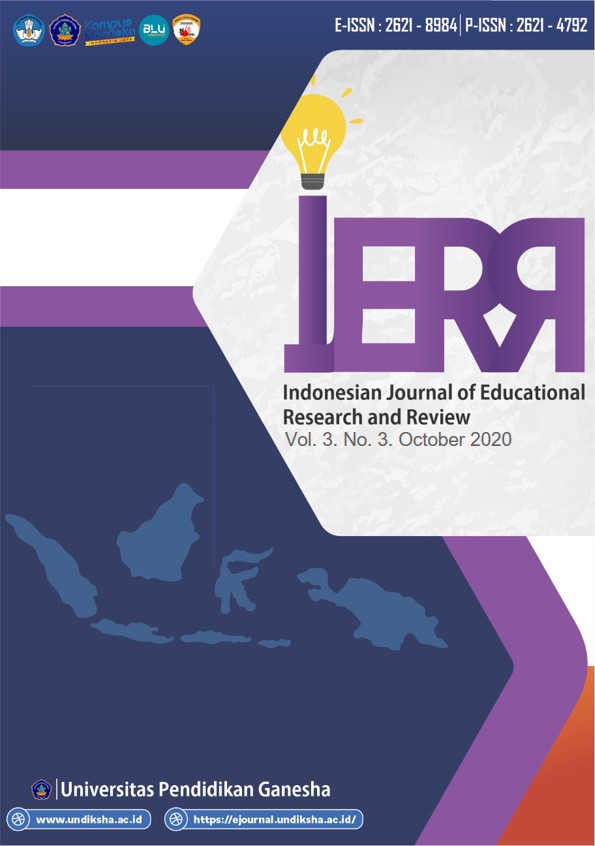The Classroom Management In English As A Foreign Language Classroom At State Junior High School
DOI:
https://doi.org/10.23887/ijerr.v3i3.29347Keywords:
Classroom Management, Students’ Misbehavior, a Big EFL Classroom.Abstract
This study aims to find out the way the EFL teacher manages students’ misbehavior and a big EFL classroom at junior high school. This research applied a qualitative research method. The findings of the research showed that the teacher had fulfilled the students’ needs in the classroom. Those are the needs for survival, love or belonging, freedom, power, and fun. To fulfill the survival needs the teacher improved the students’ concentration to follow the lesson. For the needs of love or belonging, the teacher ensured the students to feel that they were cared for and had comfort in the classroom. For freedom needs, the teacher makes the students feel independent and more confident. The teacher complimented the students in fulfilling the power needs of the students. Besides, the teacher made a joke in a learning activity and by doing so the fun need was met. However, the teacher did not have a specific strategy to fulfill the students’ needs.
References
Aliakbari, M., & Bozorgmanesh, B. (2015). Assertive classroom management strategies and students’ performance: The case of EFL classroom. Cogent Education, 2(1). https://eric.ed.gov/?id=EJ1087977
Bahanshal, D. A. (2013). The Effect of Large Classes on English Teaching and Learning in Saudi Secondary Schools. English Language Teaching, 6(11), 49-59. https://eric.ed.gov/?id=EJ1078444
Brophy, J. (1988). Educating teachers about managing classrooms and students. Teaching and teacher Education, 4(1), 1-18. https://doi.org/10.1016/0742-051X(88)90020-0
Bru, E., Stephens, P., & Torsheim, T. (2002). Students' perceptions of class management and reports of their own misbehavior. Journal of School Psychology, 40(4), 287-307. https://doi.org/10.1016/S0022-4405(02)00104-8
Cajkler, W., & Addelman, R. (2013). The practice of foreign language teaching. Routledge.
Djigic, G., & Stojiljkovic, S. (2011). Classroom management styles, classroom climate and school achievement. Procedia-Social and Behavioral Sciences, 29, 819-828. https://doi.org/10.1016/j.sbspro.2011.11.310
Emmer, E. T., & Stough, L. M. (2001). Classroom management: A critical part of educational psychology, with implications for teacher education. Educational psychologist, 36(2), 103-112. https://doi.org/10.1207/S15326985EP3602_5
Fowler, J., & Şaraplı, O. (2010). Classroom management: What ELT students expect. Procedia-Social and Behavioral Sciences, 3, 94-97. https://doi.org/10.1016/j.sbspro.2010.07.017
Frey, L. M., & Wilhite, K. (2005). Our five basic needs: Application for understanding the function of behavior. Intervention in School and Clinic, 40(3), 156-160. https://doi.org/10.1177/1050400030401
Greenberg, J., Putman, H., & Walsh, K. (2014). Training Our Future Teachers: Classroom Management: Revised. National Council on Teacher Quality.
Habibi, A., Mukminin, A., Najwan, J., Sofwan, M., Haswindy, S., Marzulina, L., ... & Harto, K. (2018). Investigating EFL classroom management in pesantren: A case study. The Qualitative Report, 23(9), 2105-2122. https://core.ac.uk/download/pdf/291991664.pdf
Habibi, A., Mukminin, A., Sofwan, M., & Sulistiyo, U. (2017). Implementation of classroom management by English teachers at high schools in Jambi, Indonesia. Studies in English Language and Education, 4(2), 172-189. https://doi.org/10.24815/siele.v4i2.6104
Harmer, J. (2007). The practice of English language teaching. Harlow: Pearson Longman.
Jiwandono, D., & Rukmini, D. (2015). Types of classroom interactions in the implementation of mini drama script project. English Education Journal, 5(2). https://journal.unnes.ac.id/sju/index.php/eej/article/view/9797
Keristiana, T., Arbain, A., & Fitriana, R. (2019). Teachers’ Strategies in Managing a Large Class in Teaching English at SMP Negeri 01 Tanjung Selor. Borneo Educational Journal (Borju), 1(1), 37-49. https://doi.org/10.24903/bej.v1i1.258
Kianipour, O., & Hoseini, B. (2012). Effectiveness of training the choice theory of Glasser to teachers on improvement of students’ academic qualification. Journal of Educational and Instructional Studies in the World, 2(2), 117-123. https://www.academia.edu/download/58451033/paper_22.pdf#page=123
Lindgren, H. C., & Suter, W. N. (1967). Educational psychology in the classroom (Vol. 956). Wiley.
Marashi, H., & Azizi-Nassab, F. (2018). EFL teachers’ language proficiency, classroom management, and self-efficacy. International Journal of Foreign Language Teaching and Research, 6(22), 89-102. http://jfl.iaun.ac.ir/article_601313.html
Miller, R., & Pedro, J. (2006). Creating respectful classroom environments. Early childhood education journal, 33(5), 293-299. https://doi.org/10.1007/s10643-006-0091-1
Rijali, A. (2019). Analisis data kualitatif. Alhadharah: Jurnal Ilmu Dakwah, 17(33), 81-95. https://dx.doi.org/10.18592/alhadharah.v17i33.2374
Rindu, I., & Ariyanti, A. (2017). Teacher’s role in managing the class during teaching and learning process. Script Journal: Journal of Linguistic and English Teaching, 2(1), 83-100. https://doi.org/10.24903/sj.v2i1.77
Sugiyono. (2011). Metode Penelitian Kuantitatif, Kualitatif, dan R&D. Alfabeta
Sulistiyo, U. (2016). English language teaching and efl teacher competence in indonesia. Proceedings of ISELT FBS Universitas Negeri Padang, 4(2), 396-406. http://ejournal.unp.ac.id/index.php/selt/article/view/7001
Syarifah, E. F., & Emiliasari, R. N. (2016). Classroom Management Strategies In An Efl Class. In UNNES International Conference on ELTLT (English Language Teaching, Literature, and Translation) (pp. 230-235).
Trang, N. M. (2015). Large classes: Universal teaching and management strategies. LangLit: An International Peer-Reviewed Open Access Journal.
Yazdanmehr, E., & Akbari, R. (2015). An expert EFL teacher’s class management. Iranian Journal of Language Teaching Research, 3(2), 1-13. https://dx.doi.org/10.30466/ijltr.2015.20386.
Downloads
Published
How to Cite
Issue
Section
License
Authors who publish with the Indonesian Journal of Educational Research and Review (IJERR) agree to the following terms:
- Authors retain copyright and grant the journal the right of first publication with the work simultaneously licensed under a Creative Commons Attribution-ShareAlike 4.0 International License. that allows others to share the work with an acknowledgment of the work's authorship and initial publication in this journal.
- Authors are able to enter into separate, additional contractual arrangements for the non-exclusive distribution of the journal's published version of the work (e.g., post it to an institutional repository or publish it in a book), with an acknowledgment of its initial publication in this journal.
- Authors are permitted and encouraged to post their work online (e.g., in institutional repositories or on their website) prior to and during the submission process, as it can lead to productive exchanges, as well as earlier and greater citation of published work. (See The Effect of Open Access)









